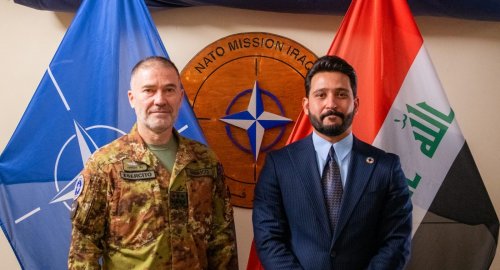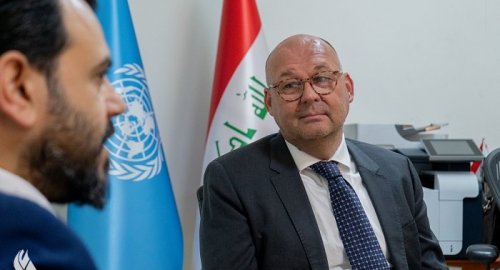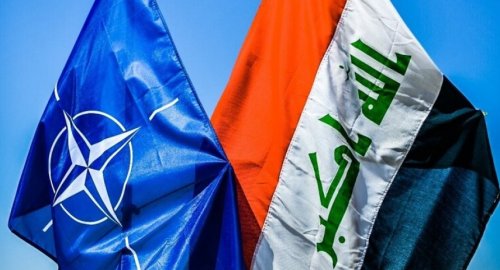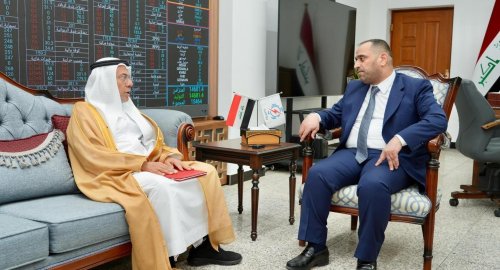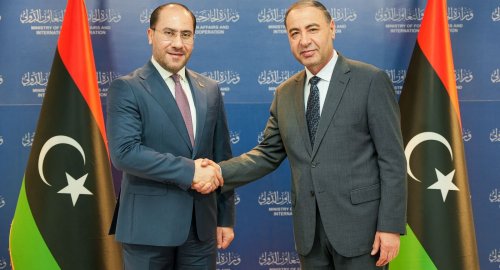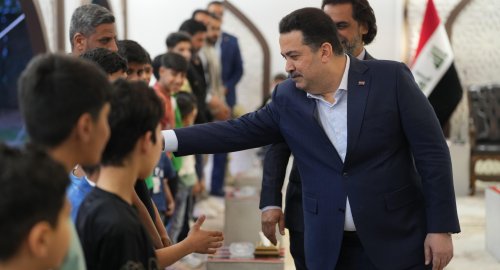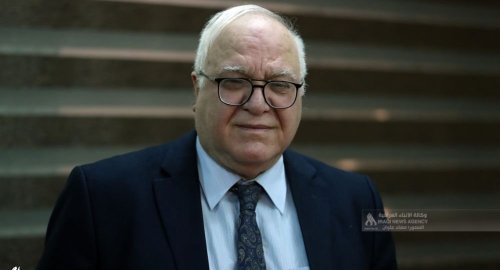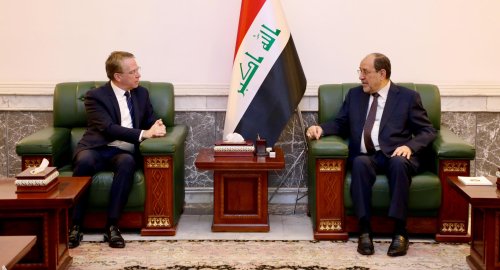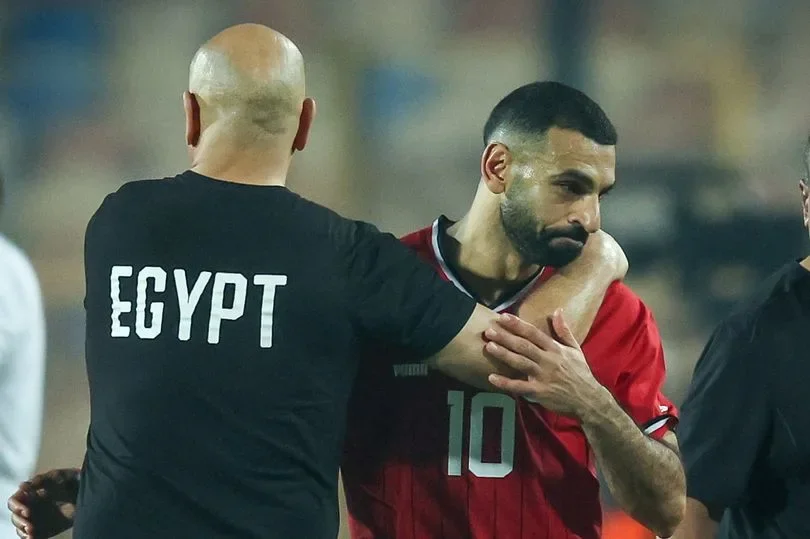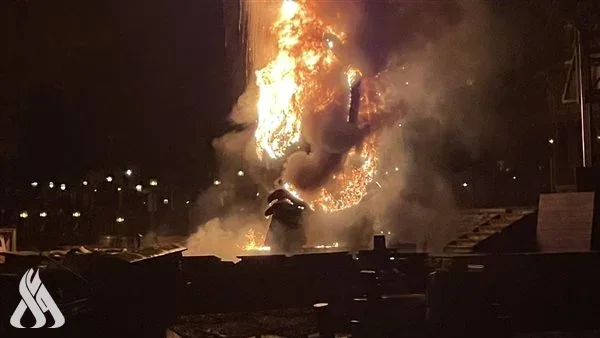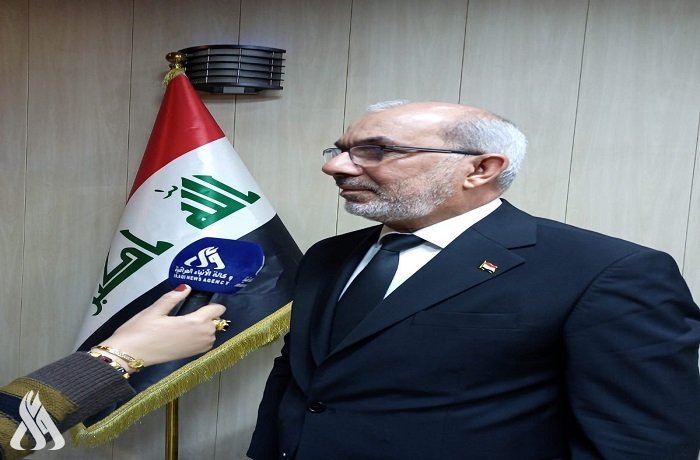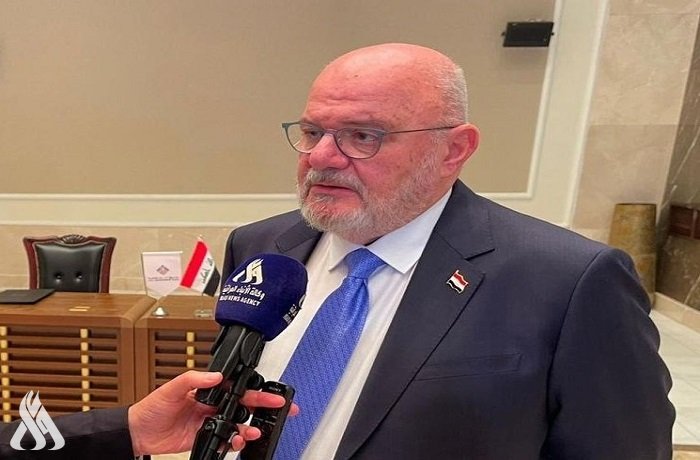
INA discusses 16 key files with INM Commander

- 16-02-2025, 14:32
Baghdad-INA
The commander of the NATO Mission in Iraq, Lieutenant General Lucas Schreurs, reaffirmed on Saturday, that NMI is a non-combat mission, focusing solely on advising and assisting Iraqi forces. He emphasized NATO’s long-term partnership with Iraq, outlining 32 key objectives aimed at bolstering security and military training.
Schreurs also announced ongoing efforts to send Iraqi officers for training at NATO academies. Meanwhile, he described the security situation in Baghdad as stable, highlighting the swift and effective response to ISIS threats.
Lieutenant General Lucas Schreurs, in an interview with the Iraqi News Agency (INA), stated, “The NATO mission in Iraq is a non-combat mission and we are military people who do advice and assistance to the Iraqi security forces upon Request of the Iraqi government,” noting that “the Iraqi government invited us now over a little bit over six years to come and give advice and assistance to the Iraqi security forces, and most of the time, with Ministry of Defense to the military personnel, but also in the Ministry of interior for the Federal police”.
He highlighted that,"NATO mission focuses on providing advise and assist on whatever the Iraqi government wants, which is within the NATO capabilities, therefore, it's so important that we have the 32 long-term objectives and as soon as we have achieved the success or the end state to one of these goals, we proceed to another topic, which is upon request of the government of Iraq. So, what is up in the future largely depends on what the Iraqi government is requesting upon us".
Iraq-NATO partnership
He pointed out, “There is a deepening relationship between NATO and Iraq. As we just had the visit of the Secretary General of NATO and the (SACEUR) who is one of the highest military ranks within NATO”, affirming that” They both said that it is a great effort and welcomed effort by NATO and Iraq to deepen their partnership. And it means that Iraq wants to have a partnership with NATO to have interoperable security forces and will be met on NATO standards."
NATO mission marks its seventh year in Iraq
Lieutenant General Schreurs further stated that" The NMI mission is intended to be as long in the country as long as there is a partnership established especially that the mission is now in its seventh year of existence in Baghdad and the NMI mission will then evolve into a partnership, a long-term partnership of Iraq with NATO.”
The security situation is stabile
Schreurs stressed that “The security situation in Baghdad is very quiet and there are no incidents, yet everybody knows that there are some ISIS or Daesh remnants active in the country, which I see that they are very well taken care of, as to say, dealt with by Iraqi security forces. Sometimes with a little aid of the Combined Joint Task Force, but they're very quick in responding and keeping these remnants down, arrest them or disable them in an action they perform,” highlighting that “I think is a more dangerous situation is what is in the northeast part of Syria, where we have big refugee camps, but also are a lot of Daesh prisoners imprisoned in Syria.And it is of the utmost importance that these camps keep being very carefully guarded, and if these prisoners are unleashed in some sort of way, that might be a threat to Iraq.”
International Support for Iraq
He indicated, “There are other missions in the country who help the Iraqi security force with actively fighting Daesh, if any case. That's the Combined Joint Task Force Operation Inherent Resolve. They are here to support the Iraqi security force in the actual fight against Daesh. So, it is their task. If there is an ISIS or Daesh uprising, they will handle with that. And in this task force are also a couple of NATO countries involved. There's a broader coalition than NATO”.
He confirmed that “There are more partners involved in security issues. For instance, the European Advisory Mission helps with the local police. And the local police is on a local level very important for security of the normal people who are living in the villages, in the towns. Andin order to de-conflict our efforts, we talk a lot to the EUAM, but as well to UNDP and other partners in the country”.
32 long-term Objectives
He underscored, “NATO prioritizes the institutional reform, talking about how to do long-term procurements, build policies, and how to better prepare the Iraqi security forces for the future, for the future fights, and how to be able to do sustained and longer operations”.
He affirmed that “we agreed with the Iraqi government on what we call 32 long-term objectives. That is what we commonly have set as goals for the NMI mission. And that goes from procurement to how to train Iraqi security forces, how to conduct exercises on up to NATO standards. So, there's a very broad spectrum of 32 of these long-term objectives we mutually agreed upon and trying to, well realize as soon as possible”.
He further explained, “NATO strategy is always shifting a little bit, for instance, from the Ukrainian war, there is more a focus on cyber security and on drone warfare. And we see that in the requests we have from Iraqi security parts, they are more focused on these sorts of new types of warfare. That's what we try to address to ensure the best outcomes”.
A codification system
Lieutenant General Schreurs continued by pointing out that “NATO tries to build as tangible steps as possible. For example: NATO uses a codification system so that any NATO member, any NATO soldier can order his uniform. So within my jacket and every other NATO soldier, you see a small number. And if you type that in a computer system, you get your jacket”.
He affirmed that “This system is also to be implemented in Iraq, because if you want to be a NATO partner, you can also benefit from our logistical support systems. But it also starts steps to be taken, first to have an office. And you have the hardware, software, people who are trained and skilled to use this system”.
“So, you build these small little steps. And by achieving all of these steps, you can measure progress. And that is the way we try to measure progress on all of these 32 long-term objectives,” he noted.
Three Key objectives
He added that "the main objectives for advising security forces are diverse and include three key divisions, and one is clearly focusing on how to better procure. And that also links with the financial system of Iraq, that you know how to procure and better make use of your own system. I think that is very important for the Iraqi security force to be well equipped and be prepared with the right quality and quantity of weapon systems they need in the future”.
He also mentioned “The other aspect involves training officers starts with junior officers being in the academy. And that is very important if you want to build a new leadership to be present over there. and that's what we do with the education division, And I think it's very important for the Iraqi soldiers and the units that we train them up to NATO standards. And that is why we were involved in these training programs with the units, trying to learn from how to build a proper exercise and evaluate it and learn from it”.
“And I think that's important, all the topics we do. And besides that, we do a lot of what we call cross-cutting teams, which we like to see back in all different parts of our advisory work,” he noted.
Lieutenant General Schreurs affirmed that “the NATO mission in Iraq has different components; we have the ministerial advisory division who focus on procurement of weaponry. And we never tell the Iraqi government what to buy, but how to buy, to get a better deal for the money, to know what to buy, which is based on a strategy. Then we have the professional security education division. And they will focus on curricula within the military schools and academies. And we also have the training development division which focuses on training Iraqi security forces using multiple assets in one direction like how to use drones to support artillery attacks.”
OCC
“Training up to NATO standards will help us to evaluate the strength of the Iraqi security forces and bring them up to NATO standards. We have a special programme for that. That is the Operational Capabilities Concept- OCC programme,” he elaborated.
“OCC is run by SHAPE in Belgium. That is one of the NATO headquarters. And that will assess the Iraqi security force and bring them up to NATO level of performance,” he continued.
He also affirmed, “And in that way, by giving training programs, assessing it will bring the individual Iraqi units up to NATO standards."
Training Iraqi officers at NATO member state academies
Lieutenant General Schreurs confirmed that “There are a lot of out-of-country activities as Whenever in the programme it is necessary in one of these long-term objectives to have people learn from other NATO states, we send sometimes people to other countries. And that might be Italy that can be Spain that can be Germany that can be England. All NATO members participate in these out-of-country activities”.
He noted that "one Iraqi major who joined the staff college in Australia. And he was very fluent in English, but I could clearly hear his accent that he had been studying in Australia. So, there are exchanges, a lot of out-of-country activities” affirming that “we also bring expert teams into Iraq. That is sometimes more efficient if you have larger groups you want to train that you bring the experts over here.”
"The ability of Iraqi soldiers to adapt to training according to NATO standards will be tested through the OCC programme as the first testing will be done next year but if I see that in a more general perspective, I see that the Iraqi security forces are very adaptive to new situations. For instance, when they bought a new system, a communication system, they were very quickly in making that work within the entire Iraqi security forces, and at a speed and a level that you hardly see in any other NATO country,” expressing admiration by Iraqi soldiers’ agility and readiness, which were on a very high level.”
“The cyber security and also cyber IT related things, drone things is very rapid evolving technology. So, it is important to build a policy. How do we have this implemented in the Iraqi security forces? And then, of course, you have to see what you need in order to be effective as soon as you are going to implement this policy,” the Lieutenant General continued.
Key elements in modern warfare
Lieutenant General Schreurs stressed that “New technology takes a lot of money, makes a lot of, I would say, thinking, preparing the Iraqi security forces to use this. As we see, and the whole world is learning from the Ukraine-Russian war, that cyber security and drone warfare is very important. We have to make a way, develop the policy and strategies how to implement that in the Iraqi security forces”.
Integrating drones into surveillance operations
“On a smaller scale, we do that. We have developed an exercise together with the Iraqi security force how to integrate drones which are viewing at a target and then have artillery firing upon that target to be more effective over longer distance. And that was very successful,” he continued.
“And that is implemented in the entire security force structure. So, we're helping, but also, we have to procure. But with these sorts of systems, it's always very difficult because the technology is so rapidly evolving that it's hard to keep up”.
He noted that,"But that's something, that's a challenge for Iraq, but also for many other countries, to keep up with that speed of development. But that's something we have to work on”.
Border security
The Lieutenant General affirmed that “Border security is at the moment not in the portfolios we would say, of the NATO mission in Iraq. However, we train, of course, Iraqi security force in operations you also can use at the border. So how you seal off the border with Syria is one of the things we train. How we train units, how to patrol, how to build positions,” noting that “NMI don't go to the border because we are a non-combat mission, but it gives the advice and have the Iraqi security force prepared for this sort of operations”.
Enhancing Women’s role in Iraqi Security Forces
“NMI is working to support Iraq in enhancing diversity and women's leadership in its military and security forces through several initiatives and strategies,” He said. “The right of women to serve in the security forces is a legitimate right, as it enhances diversity of thought and is considered a good economic principle. Searching for male soldiers only can sometimes be challenging, so working with women to build strong and effective teams is a positive approach”.
He went on to say, “NATO has also one of the long-term objectives of having (women, peace and security) is one of them. And that's why we discussed the role of the Iraqi females in the Iraqi security forces. And we see a growing number of at least Iraqi female officers in the army. And we also see that the women's department in the Iraqi security forces, especially in the MOD is positioned in a better way than when we started”.
“NMI evolves over the years because times are changing, the demands will be needing, and I see that the Iraqi security force are developing themselves. And if you bring yourselves to a higher level, then the questions asked to us will be of a higher level than we are now. So that will change over the years, because I'm convinced that the Iraqi security forces will step up to the NATO standards and therefore the questions to advise and assist will be of a higher level in the near future,” he highlighted.
“So, we will evolve, we will do that together as we're working toward that partnership, because partners develop each other's relationship over the years”.
Combined Joint Warfare
Lieutenant General Schreurs remarked, “I think is very important that Iraq focus on what we call combined joint warfare, and you see that traditionally the Iraqi forces have a very strong land force, but they must be able over the years to integrate air force, air defense and drone warfare and that all has to be connected via command-and-control systems. As the power of not only the soldier on land, but together with the old weaponry which is around him will be even stronger”.
He also commended the quick response of Iraqi security forces, “But I think there are little highlights already. If we see if there is a Daesh or ISIS threat in some spots of Iraq, you see there is a very quick response. And we see an ever-growing capability of quickly dealing with that but also using airstrikes and artillery, “affirming that “But Iraq is a big country, and it has many neighbors. So, it is a challenging task.”
He noted,” the leaderships of the Iraqi security forces are very involved in the safety of their country as they are paying maximum attention to that situation and have Iraq prepared or at least shielded off with everything what is happening in Syria”.
Image
NATO’s Key Initiatives in Iraq
“NATO focuses on what we do as NATO helping to improve the Iraqi security force and the federal police. But we have a lot of other missions within Iraq as UNDP, the EU, EUAM, but also bilateral support,” he pointed out.
Schreurs affirmed that “Netherlands offers sometimes projects to the Iraqi government as many other nations do to help develop Iraq, especially in desalination, water management all very important to the future of Iraq,” urging “The neighboring countries of Iraq, as well as other nations, contribute to supporting its progress and stability”.
He further stated, “Most Western countries still feel that it is an unsafe situation in Iraq, thus it is also important for the NATO mission that we show that it is improving. And that is why I also paid a visit to Babylon to show that we are able to go over there, especially in the year of tourism, that it is important to keep on supporting Iraq”.
Image
Iraq rich culture
NMI commander expressed that he is profoundly influenced by the depth of Iraqi hospitality, “Since I've been arriving in Iraq, it's now in May of last year, I've been struck by the Iraq hospitality, by the generosity of its people, but also by the adaptivity of the people and its rich culture. And that gives me real pleasure and pride in trying to help Iraq to come to a more stable and secure environment.”
“All people deserve peace and stability, that they can live happy lives, and if we can contribute in any way to that, we'd love to do that. And that is what we're working for and that's what we are here for,” he added.
MOE to build a 1,000-megawatt solar power plant with UAE
- Economy
- 10:05
Mo Salah's replacement is Real Madrid
- Sport
- 25/03/21
Barcelona Requests Release of 3 Players from Spain Friendly
- Sport
- 25/03/21
Fire breaks out at Disney's Epcot theme park as huge plume of smoke rises over resort
- International
- 25/03/23
